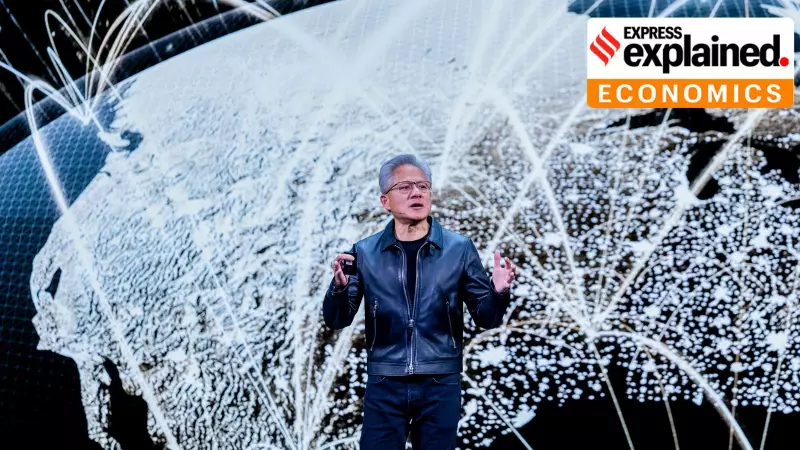
Amid growing concerns about an artificial intelligence market bubble, chipmaking giant Nvidia has delivered quarterly results that temporarily silenced skeptics. The company announced staggering third-quarter earnings that surpassed all industry expectations, providing a strong counterargument to those predicting an imminent AI market collapse.
Record-Breaking Financial Performance
On Wednesday, November 20, 2025, Nvidia revealed its highest-ever quarterly revenue of $57 billion, representing an impressive 62% growth over the previous year. The company's data center business emerged as the primary driver, contributing $51.2 billion to the total revenue. Even more remarkably, Nvidia projected fourth-quarter revenue of approximately $65 billion, significantly higher than industry expectations of $61 billion.
The immediate market response was overwhelmingly positive, with Nvidia's shares gaining 5% in extended trading. According to Reuters, the company was poised to add a staggering $220 billion in market value following the announcement. This performance reversed a declining trend that had seen Nvidia's shares drop nearly 8% earlier in November, despite having surged by 1,200% over the past three years.
CEO Jensen Huang's Confident Stance
Nvidia's charismatic CEO Jensen Huang directly addressed the AI bubble speculation during an analyst call. "There's been a lot of talk about an AI bubble. From our vantage point, we see something very different," Huang stated confidently. He emphasized Nvidia's ubiquitous presence in cloud infrastructure, noting "We're in every cloud. The reason why developers love us is because we're literally everywhere."
Nvidia maintains a dominant position in the production of graphics processing units (GPUs), the specialized chips essential for training and running complex AI models. These chips are deployed in specialized data centers worldwide, forming the backbone of the current AI infrastructure boom.
The Bubble Debate Intensifies
The timing of Nvidia's strong performance couldn't be more critical. Recent weeks have seen increasing speculation about the sustainability of the AI boom, with several market indicators suggesting a potential correction. The debate gained significant momentum following actions by prominent investors and industry leaders.
Most notably, Michael Burry - the investor famous for predicting the 2008 financial crisis - announced the closure and delisting of his hedge fund, Scion Asset Management, on October 27. Through cryptic social media posts, Burry has strongly suggested that the AI bubble is poised to burst. In one particularly telling post from October 31, he wrote: "Sometimes, we see bubbles. Sometimes, there is something to do about it. Sometimes, the only winning move is not to play."
Other significant developments include OpenAI CEO Sam Altman backtracking on a company statement about potential US government bailouts, and reports that venture capitalist Peter Thiel had sold his entire stake in Nvidia by September 30. SoftBank also announced similar divestments last week.
Industry Leaders Voice Caution
Google and Alphabet CEO Sundar Pichai added to the cautious narrative during a BBC interview on November 18. While characterizing AI growth as an "extraordinary moment," Pichai acknowledged there had been some "irrationality" in the current AI boom. When questioned about Google's position regarding a potential AI bubble burst, he responded: "I think no company is going to be immune, including us," while maintaining that Google was well-positioned to weather any storm.
Understanding Economic Bubbles
An economic bubble occurs when market prices for assets significantly exceed their intrinsic value, typically driven by overly optimistic investor behavior. The fragility becomes apparent once asset prices peak or following specific events that cause investors to reconsider their positions, often leading to panic selling.
The concept traces back to economist Hyman Minsky's Financial Instability Hypothesis, which suggests that "stability breeds instability." According to this theory, prolonged economic stability encourages speculative behavior, ultimately increasing the likelihood of a market crash. The "Minsky Moment" describes the turning point when market participants recognize the instability of the system, potentially triggering widespread economic crisis.
The dot-com bubble collapse of the 2000s serves as a classic example, where investors poured money into internet startups without proven business models. Many analysts see parallels with the current AI investment frenzy.
Why AI Bubble Concerns Persist
Despite Nvidia's strong performance, several factors continue to fuel concerns about an AI bubble:
First, a Bloomberg report in October highlighted the circular nature of AI financing, where the same capital appears to be circulating among multiple companies while individual valuations continue to soar. The report emphasized the outsized roles of Nvidia and OpenAI, who have announced reciprocal investment plans worth billions of dollars.
Second, analysts express caution about Nvidia's aggressive deal-making strategy. The company has invested $24 billion in deals with AI ecosystem companies in 2025 alone, according to Pitchbook data. Some find it curious that the world's most valuable company primarily provides infrastructure rather than consumer-facing services.
Third, the AI use-case as a profit-generating business model remains largely unproven. The current boom seems driven by optimism about capacity generation rather than demonstrated monetization potential.
Fourth, concerns about sustainable capacity generation are growing, with reports of substantial electricity consumption by data centers and negative externalities like water shortages affecting communities near these facilities.
Finally, the practical application of AI has been limited to what Harvard Business Review termed "workslop" - AI-generated content that appears substantive but fails to meaningfully advance tasks. Meanwhile, OpenAI's goal of achieving Artificial General Intelligence remains distant, as CEO Sam Altman acknowledged in August.
As the AI revolution continues to unfold, Nvidia's impressive quarterly results provide temporary reassurance to markets. However, the underlying concerns about sustainability, circular financing, and unproven business models ensure that the AI bubble debate will continue to dominate financial discussions in the coming months.





